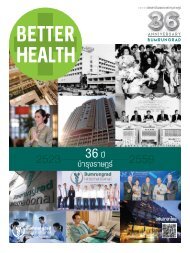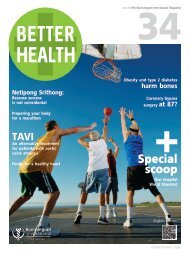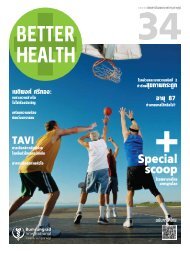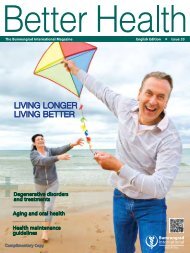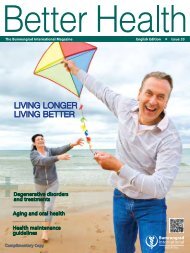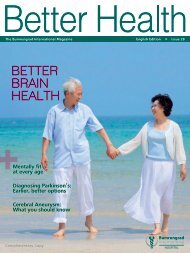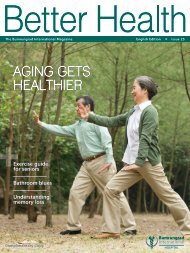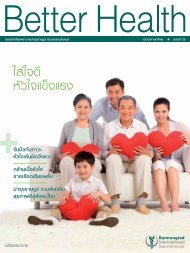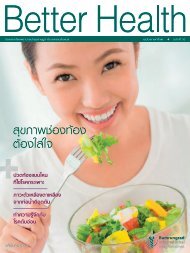All pdf BH Issue 33 Eng
You also want an ePaper? Increase the reach of your titles
YUMPU automatically turns print PDFs into web optimized ePapers that Google loves.
Fiber: This material assists the excretory system in<br />
working properly and prevents possible intestinal<br />
problems. Remember to have vegetables and fruits with<br />
each meal to get sufficient amounts of fiber.<br />
Water: Water helps deliver nutrients to organs, helps<br />
with bowel movement, prevents constipation, and<br />
moisturizes skin. Drink six to eight glasses of clean water<br />
(or unsweetened herbal drinks as an alternative) daily.<br />
Regular exercise<br />
Regular body movement and exercise helps maintain<br />
joint health and muscular strength, and prevents joint<br />
stiffness and pain often afflicting older people. Regular<br />
exercise can prevent these common problems:<br />
Exercises to halt and reverse low bone mass (osteoporosis):<br />
The program should include weight-bearing exercises or<br />
exercises that directly stimulate muscles. Great exercises<br />
that use one’s own body weight include walking, Tai Chi,<br />
dance, and cycling.<br />
Exercises to prevent falls: Do exercises that promote<br />
body balance, coordination of muscles, and increase<br />
muscle strength. For example, standing up and sitting<br />
down exercises from a chair, or lifting your legs up and<br />
down while grabbing the back of a chair.<br />
Exercises to reduce urinary incontinence: This involves<br />
regular clenching of the pelvic floor muscle to increase<br />
tightness and enhance the excretory system. Do it 50 to<br />
100 times per day. Moreover, don’t retain urine for too<br />
long. Doing so can lead to bladder infections, so urinate<br />
when you first feel the urge.<br />
Exercise to reduce knee joint degeneration: This exercise<br />
emphasizes the strengthening of muscles around the<br />
knee joint. Sit with your feet on the floor and stretch the<br />
knees up and down, remaining in each position while<br />
counting from 1 to 10. We don’t recommend exercises<br />
that involve walking up and down the stairs, squatting,<br />
or kneeling.<br />
Exercises to increase the strength of the cervical and<br />
lumbar spine: These focus on proper positions for sitting,<br />
standing and walking. Try to sit up straight and not<br />
crook or extend the back excessively to prevent muscle<br />
degeneration.<br />
Exercises to correct stiffness of the shoulder (frozen<br />
shoulder): Try the wall climbing posture or back rubbing.<br />
Warning: Always consult with your doctor or physical<br />
therapist before practicing any exercise postures. If during<br />
(or after exercise) you experience double vision, fainting,<br />
headache, irregular heartbeat, shortness of breath, or chest<br />
pain, stop immediately and inform your health professional.<br />
Annual health check-up<br />
Older persons should have a health check-up once a year,<br />
including eye and oral examinations, to minimize the risk<br />
of unexpected health concerns.<br />
Package for elderly health check-up<br />
Vital signs and physical examination, blood<br />
tests, sugar, fasting blood sugar, and lipid<br />
(fats) profile<br />
Gout<br />
Examination/test<br />
Kidney, liver function panel, and thyroid panel<br />
Hepatitis screening<br />
CEA for GI cancer and AFP for liver cancer<br />
PSA for prostate cancer<br />
Urine examination and stool examination<br />
with occult blood<br />
Electrocardiogram (EKG)<br />
Exercise stress test (EST)<br />
Chest X-Ray<br />
Ultrasound whole abdomen<br />
Digital mammogram with breast ultrasound<br />
Pap smear and pelvic exam<br />
Vitamin B12, Vitamin D<br />
Electrolytes: Sodium and Potassium<br />
Calcium<br />
Bone density L-spine & Hip<br />
Microalbuminuria<br />
Eye examination with dilated eye examination<br />
55-69 Y 70+ Y<br />
Male only<br />
Male only<br />
Female only<br />
Female only<br />
Female only<br />
*See more information and options for a customized check-up at<br />
www.bumrungrad.com or tel. 0-26670-1515<br />
Vaccination for immunity<br />
Male only<br />
Female only<br />
Female under 80<br />
Vaccinations are another key component of elder health<br />
because they prevent diseases that degrade the quality of<br />
life, and can also help to save on medical care costs. Vaccines<br />
suggested for older persons include:<br />
Influenza: Get this annual vaccination, which is reformulated<br />
every year, to guard against mutating strains.<br />
Doctors recommend it before the rainy or winter seasons.<br />
Tetanus: Get this every 10 years to prevent tetanus from<br />
uncleaned wounds or wounds from accidental falls.<br />
Pneumococcal conjugate: This prevents pneumonia, otitis<br />
media, sinusitis, bloodstream infections, and meningitis.<br />
Vaccination with two groups of strains provides lifetime<br />
protection, over the age of 65.<br />
Herpes zoster virus: People 60 years old and older should<br />
get this vaccination to reduce the chance and severity of<br />
developing shingles. It requires only one injection.<br />
21



